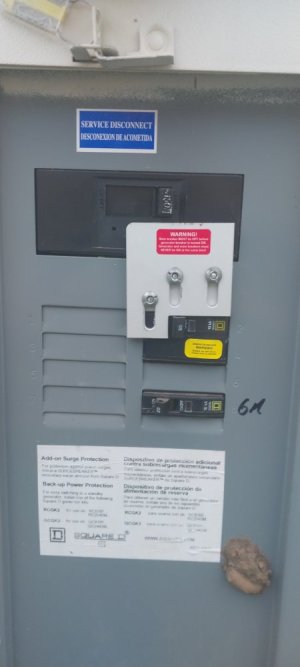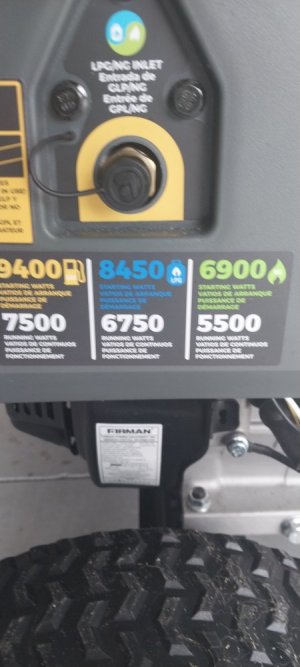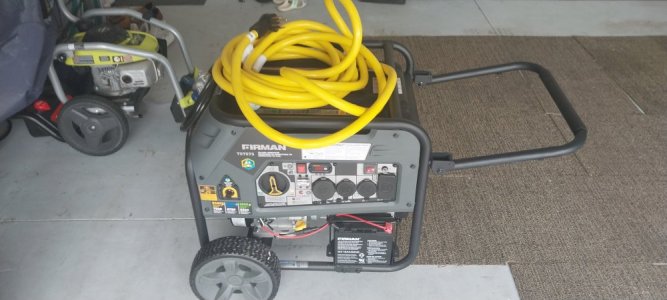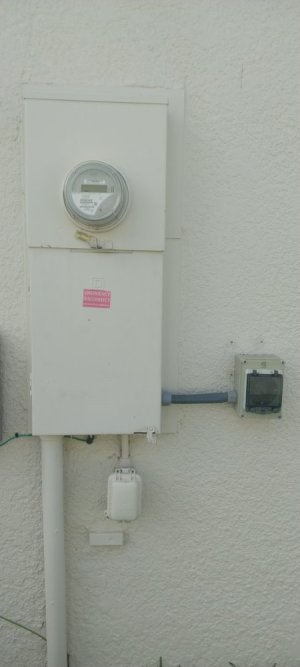Portable propane generators
- Thread starter VolNExile
- Start date
tbh
Adequately Gruntled Member
- Joined
- Jun 12, 2017
- Messages
- 3,042
- Likes
- 5,508
Anybody got one? Any recommendations?
Looking at ~3,000-3,5000W, especially with the option of an automatic transfer switch.
View attachment 684831
My parents have one (I think it is actually a dual-fuel setup for propane and auto fuel) thay they seem to be pleased with. I'll see if I can get the specs, or at least a make/model for you.
Firebirdparts
Best tackle for his weight the old school ever had
- Joined
- Sep 13, 2014
- Messages
- 4,610
- Likes
- 8,181
In that size range that's going to be a portable generator. Kohler and Generac basically make all the propane powered built-ins. They don't make one that small. I will say though they really are nice for what they cost. I don't have one, but in my view they're both a nice piece of machinery for the reasonable money they cost.
VolNExile
Easily amused
- Joined
- May 12, 2011
- Messages
- 34,329
- Likes
- 69,617
Right, thus the thread titleIn that size range that's going to be a portable generator. Kohler and Generac basically make all the propane powered built-ins. They don't make one that small. I will say though they really are nice for what they cost. I don't have one, but in my view they're both a nice piece of machinery for the reasonable money they cost.
We don’t have (yet) enough extended outages to justify a built-in.
I’m actually considering two this size: one for the must-haves (fridge, freezer, and a few lamps and chargers), and a second for seasonal/ disaster-specific needs (the a/c-heat splits upstairs; the sump pump.) And to be a backup to the backup, I suppose.
JohnWardForever
Well-Known Member
- Joined
- Dec 3, 2008
- Messages
- 13,550
- Likes
- 11,411
VolNExile
Easily amused
- Joined
- May 12, 2011
- Messages
- 34,329
- Likes
- 69,617
JohnWardForever
Well-Known Member
- Joined
- Dec 3, 2008
- Messages
- 13,550
- Likes
- 11,411
Firman. Dual fuel, Inverter . Costs more than conventional, but the ability to burn Gasoline or Propane plus the fuel efficiency is well worth it. Uses appx 1/3 less fuel. Much Quieter too. Costco. They run them about twice a year at $100 (around that) off. But good luck with these hurricanes. I have 2 brand new (would let 1 go) But I'm in South Ala, so can't help you .That’s what I’m hoping to find. And thanks, I’d forgotten Costco!
Do you have personal experience with a particular brand/model?
VolNExile
Easily amused
- Joined
- May 12, 2011
- Messages
- 34,329
- Likes
- 69,617
I appreciate the thought! I’m leaving what’s in the stores now for those who don’t currently have power. Just gathering info for now.Firman. Dual fuel, Inverter . Costs more than conventional, but the ability to burn Gasoline or Propane plus the fuel efficiency is well worth it. Uses appx 1/3 less fuel. Much Quieter too. Costco. They run them about twice a year at $100 (around that) off. But good luck with these hurricanes. I have 2 brand new (would let 1 go) But I'm in South Ala, so can't help you .
tntar heel
Well-Known Member
- Joined
- Nov 24, 2008
- Messages
- 2,613
- Likes
- 5,241
Right, thus the thread title
We don’t have (yet) enough extended outages to justify a built-in.
I’m actually considering two this size: one for the must-haves (fridge, freezer, and a few lamps and chargers), and a second for seasonal/ disaster-specific needs (the a/c-heat splits upstairs; the sump pump.) And to be a backup to the backup, I
A couple of pictures of what I did. I parrot the above. Just a little info from my research. Biggest difference between inverter Gen vs regular is going to be that inverter supplies a more constant voltage which is better for electronics but you can purchase cords to do that to charge devices. Inverters are usually smaller, quieter and more expensive. I used my yearly rebate, our no tax weekend, a couple proctor and gamble gift cards and got the one above for about 250 bucks. Reg 849 in the store. I had to install a 50 amp breaker in the box and run the wire from inlet to main box. I then put the interlock switch on so there is no backfeeding between generator and line. Total instalation time was maybe 2 hours because I was being extra careful bc I hate electricity. Any way if you have more questions reach out. It is so simple and convenient.Like I said I can pretty much run the whole house including a freezer in garage and AC. In the size that bought.I appreciate the thought! I’m leaving what’s in the stores now for those who don’t currently have power. Just gathering info for now.
Attachments
tntar heel
Well-Known Member
- Joined
- Nov 24, 2008
- Messages
- 2,613
- Likes
- 5,241
hog88
Your ray of sunshine
- Joined
- Sep 30, 2008
- Messages
- 118,509
- Likes
- 173,229
A couple of pictures of what I did. I parrot the above. Just a little info from my research. Biggest difference between inverter Gen vs regular is going to be that inverter supplies a more constant voltage which is better for electronics but you can purchase cords to do that to charge devices. Inverters are usually smaller, quieter and more expensive. I used my yearly rebate, our no tax weekend, a couple proctor and gamble gift cards and got the one above for about 250 bucks. Reg 849 in the store. I had to install a 50 amp breaker in the box and run the wire from inlet to main box. I then put the interlock switch on so there is no backfeeding between generator and line. Total instalation time was maybe 2 hours because I was being extra careful bc I hate electricity. Any way if you have more questions reach out. It is so simple and convenient.Like I said I can pretty much run the whole house including a freezer in garage and AC. In the size that bought.
Anyone installing a plug for a generator take this advice and be sure to install the switch to prevent back feeding into the grid.
Halph66
We should've gotten the live chicken.
- Joined
- Sep 2, 2012
- Messages
- 12,311
- Likes
- 40,482
There are conversion kits that will allow a gasoline engine to run on propane or natural gas. They are very reasonable, like $200. I think I may have spent $100 maximum for all the hose, fittings, and valves to hook to my home natural gas line.
YouTube video:
I converted mine to natural gas and it worked very well. It is simple to install. Tuning is easy and it easily switches from gasoline to natural gas (or propane) by switching the valve.
As one of the guys on YouTube pointed out, if your home is without power your local gas station probably is also. They might not be able to get fuel to the station if they do have power. If you have natural gas to your home it's the best option. The lines are underground and typically remain functional through most natural disasters.
Hope this helps. Mine worked very well.
Generator Conversion Kits to Propane and Natural Gas.
Generator conversion kits to propane, lp gas and natural gas for most gasoline generators and engines.
www.uscarburetion.com
YouTube video:
I converted mine to natural gas and it worked very well. It is simple to install. Tuning is easy and it easily switches from gasoline to natural gas (or propane) by switching the valve.
As one of the guys on YouTube pointed out, if your home is without power your local gas station probably is also. They might not be able to get fuel to the station if they do have power. If you have natural gas to your home it's the best option. The lines are underground and typically remain functional through most natural disasters.
Hope this helps. Mine worked very well.
tntar heel
Well-Known Member
- Joined
- Nov 24, 2008
- Messages
- 2,613
- Likes
- 5,241
hog88
Your ray of sunshine
- Joined
- Sep 30, 2008
- Messages
- 118,509
- Likes
- 173,229
VolNExile
Easily amused
- Joined
- May 12, 2011
- Messages
- 34,329
- Likes
- 69,617
This is great, very thorough; thanks! We’ll pay an electrician to install the switch. Believe me, my husband and I are good at varied and downright strange things, but electricity ain’t one of them.A couple of pictures of what I did. I parrot the above. Just a little info from my research. Biggest difference between inverter Gen vs regular is going to be that inverter supplies a more constant voltage which is better for electronics but you can purchase cords to do that to charge devices. Inverters are usually smaller, quieter and more expensive. I used my yearly rebate, our no tax weekend, a couple proctor and gamble gift cards and got the one above for about 250 bucks. Reg 849 in the store. I had to install a 50 amp breaker in the box and run the wire from inlet to main box. I then put the interlock switch on so there is no backfeeding between generator and line. Total instalation time was maybe 2 hours because I was being extra careful bc I hate electricity. Any way if you have more questions reach out. It is so simple and convenient.Like I said I can pretty much run the whole house including a freezer in garage and AC. In the size that bought.
I *think* I read on the FEMA site that they’d reimburse ?couple hundred? dollars on a generator purchase, but that might be only for those still without power. We have power; just no running water for the foreseeable future.
Thanks again!
VolNExile
Easily amused
- Joined
- May 12, 2011
- Messages
- 34,329
- Likes
- 69,617
A question for anyone:
Also (depressing thought), is there a way to chain, etc. these very portable generators? Same for securing propane tanks? They’d be locked away except during an emergency, but it’s during an emergency that even the very quiet inverters are audible.
No, I’m not going to sit up at night with a shotgun or any variant thereof. But there must be a way of at least making it very, very difficult to steal these things.
Also (depressing thought), is there a way to chain, etc. these very portable generators? Same for securing propane tanks? They’d be locked away except during an emergency, but it’s during an emergency that even the very quiet inverters are audible.
No, I’m not going to sit up at night with a shotgun or any variant thereof. But there must be a way of at least making it very, very difficult to steal these things.
tntar heel
Well-Known Member
- Joined
- Nov 24, 2008
- Messages
- 2,613
- Likes
- 5,241
Last year there were folks going around stealing them in middle of night. So yes it is highly advisable to chain them (by the frame) to something anchored to the house. Only imagination limits on this task.A question for anyone:
Also (depressing thought), is there a way to chain, etc. these very portable generators? Same for securing propane tanks? They’d be locked away except during an emergency, but it’s during an emergency that even the very quiet inverters are audible.
No, I’m not going to sit up at night with a shotgun or any variant thereof. But there must be a way of at least making it very, very difficult to steal these things.
superdave1984
Repeat Offender
- Joined
- Aug 14, 2007
- Messages
- 9,065
- Likes
- 6,073
VolNExile
Easily amused
- Joined
- May 12, 2011
- Messages
- 34,329
- Likes
- 69,617
Halph66
We should've gotten the live chicken.
- Joined
- Sep 2, 2012
- Messages
- 12,311
- Likes
- 40,482
VolNExile
Easily amused
- Joined
- May 12, 2011
- Messages
- 34,329
- Likes
- 69,617
Halph66
We should've gotten the live chicken.
- Joined
- Sep 2, 2012
- Messages
- 12,311
- Likes
- 40,482
VolNExile
Easily amused
- Joined
- May 12, 2011
- Messages
- 34,329
- Likes
- 69,617
Is an Emgen one of the permanently-installed generators? I'm looking at the portables (assuming that 60 lbs is portable for folks in their 70's.) The figures I've seen on dual-fuel do list higher figures for gasoline than propane, if that's what you mean. I'm going with those figures (the lower ones.)I'm pretty sure using propane de-rates the KW specification of the Emgen. Something to take into consideration when calculating load requirements.









